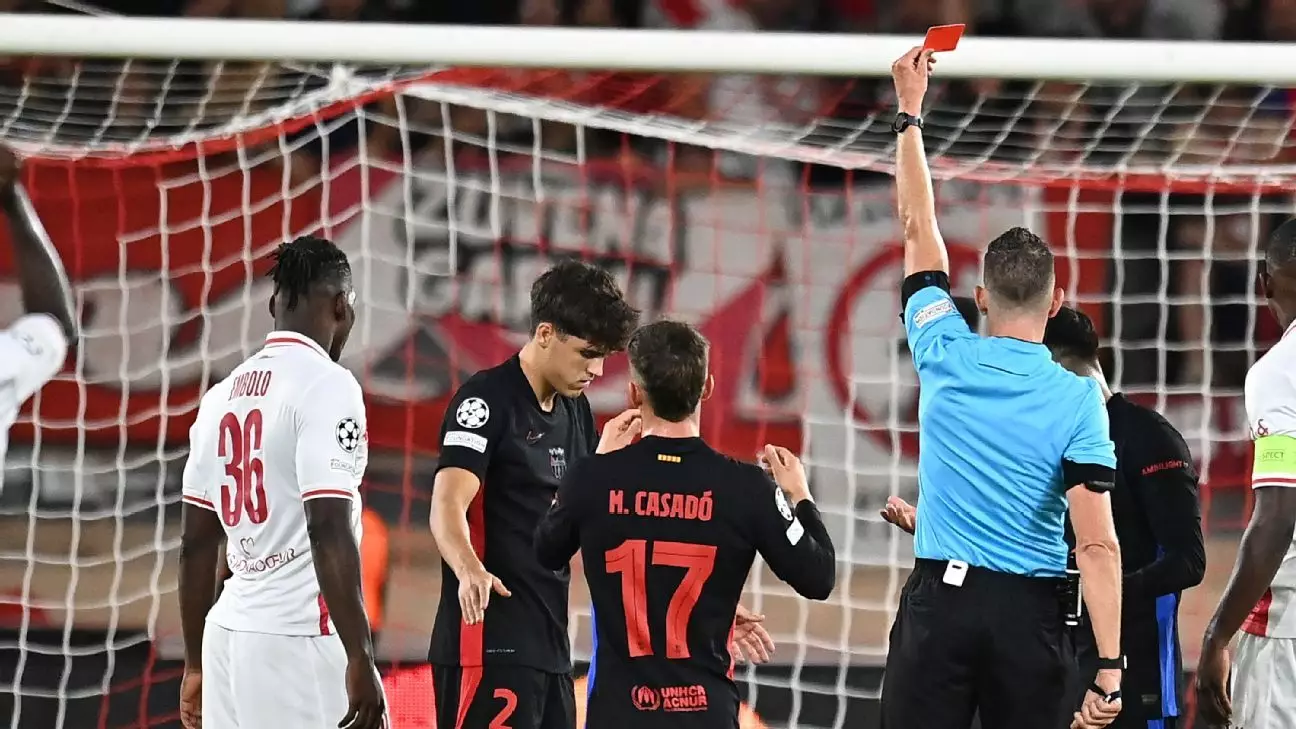Barcelona’s recent encounter with Monaco in the Champions League was a stark reminder of the unpredictability of football. Under the stewardship of coach Hansi Flick, the side aimed to continue their winning streak in what was expected to be a challenging contest. However, an early red card shown to defender Eric García altered the trajectory of the match, leading to a disappointing 2-1 loss for the Catalan giants. As Flick reflected on this setback, he grappled with both the immediate implications and the broader context of Barcelona’s Champions League aspirations.
García’s sending-off, occurring merely ten minutes into the game for a last-man tackle on Monaco’s Takumi Minamino, marked a pivotal moment that shifted the balance of play. This incident served as a catalyst for a series of defensive challenges for Barcelona, forcing them to adjust their strategy almost immediately. Flick expressed his frustration over the disruption this caused, indicating that while his team exhibited determination and effort, the early disadvantage inevitably tilted the scale in favor of Monaco.
In the wake of the red card, Barcelona struggled to maintain their composure. Flick noted, “After the red card, the game changed totally,” highlighting how the incident not only affected the team’s playing style but also altered the psychological landscape of the match. With a man down, the players were left to grapple with the pressing challenge of conserving energy while remaining competitive against an energetically charging Monaco side.
Despite the loss, Barcelona’s aspirations in the revised Champions League format remain intact. Flick’s confidence in his squad’s ability to rebound is palpable. He cited the necessity for thorough analysis and learning from defeats, stating, “We are strong enough to play a good Champions League.” This mindset is critical as they prepare for upcoming matches against formidable opponents like Bayern Munich and Borussia Dortmund. The new league structure—where the top eight teams advance directly to the knockout stage—means that Barcelona still has ample opportunity to secure their advancement, provided they capitalize on their remaining fixtures.
Flick’s optimism resonates amid concerns regarding Barcelona’s historical performance in the Champions League, particularly after recent seasons that saw the club fail to progress past the group stage. In contrast to these inconsistent past performances, the German coach is determined to maintain a positive outlook, emphasizing resilience and adaptability as key qualities for his team.
One of the central themes that emerged from the post-match discussions was the collective effort displayed by Barcelona, even in adversity. Flick acknowledged that while the team’s defense was put under immense pressure post-red card, their solidarity and teamwork were commendable. However, he also recognized the need for improvement in managing high-pressure situations, a skill crucial for progressing in European competitions.
The tight-knit defense strategy, intended to maintain balance despite the numerical disadvantage, was met with challenges from Monaco’s fast-paced attack. Flick’s reflection on the defeat suggests a clear pathway for growth: enhancing defensive fluidity while cultivating offensive opportunities. The balance between aggressive counterattack and maintaining a compact formation will be crucial for Barcelona as they navigate their upcoming games.
Among the silver linings from the defeat was the return of Ansu Fati, who made his first appearance of the season after overcoming injury concerns. Flick expressed enthusiasm over Fati’s reintegration into the squad, painting a picture of a player who has matured and developed significantly during his time away. The young forward’s presence could potentially invigorate the Barcelona offense as they look to bounce back from the Monaco setback.
Moreover, the emerging talent of Lamine Yamal cannot be overlooked. At just 17 years old, Yamal is quickly becoming a pivotal player for Barcelona, demonstrating dynamic skill and agility on the pitch. His recent performance in the defeat against Monaco—despite the challenges faced—highlighted his adaptability. Flick’s decision to substitute him early reflects a strategic approach to managing young talent, ensuring he remains a vital asset for the upcoming La Liga clash.
The journey in the Champions League is long and fraught with obstacles, and Barcelona’s recent loss to Monaco serves as a learning experience rather than a terminal setback. Through a combination of resilience, strategic analysis, and the nurturing of emerging talent, Hansi Flick’s Barcelona is poised to capitalize on future opportunities. The key will lie in their ability to learn from this initial defeat, forge stronger team dynamics, and, most importantly, remain focused on their goal of advancing further in the prestigious European tournament. As they say in football, every defeat is a lesson—one that Barcelona must embrace to ensure a brighter future.

Leave a Reply